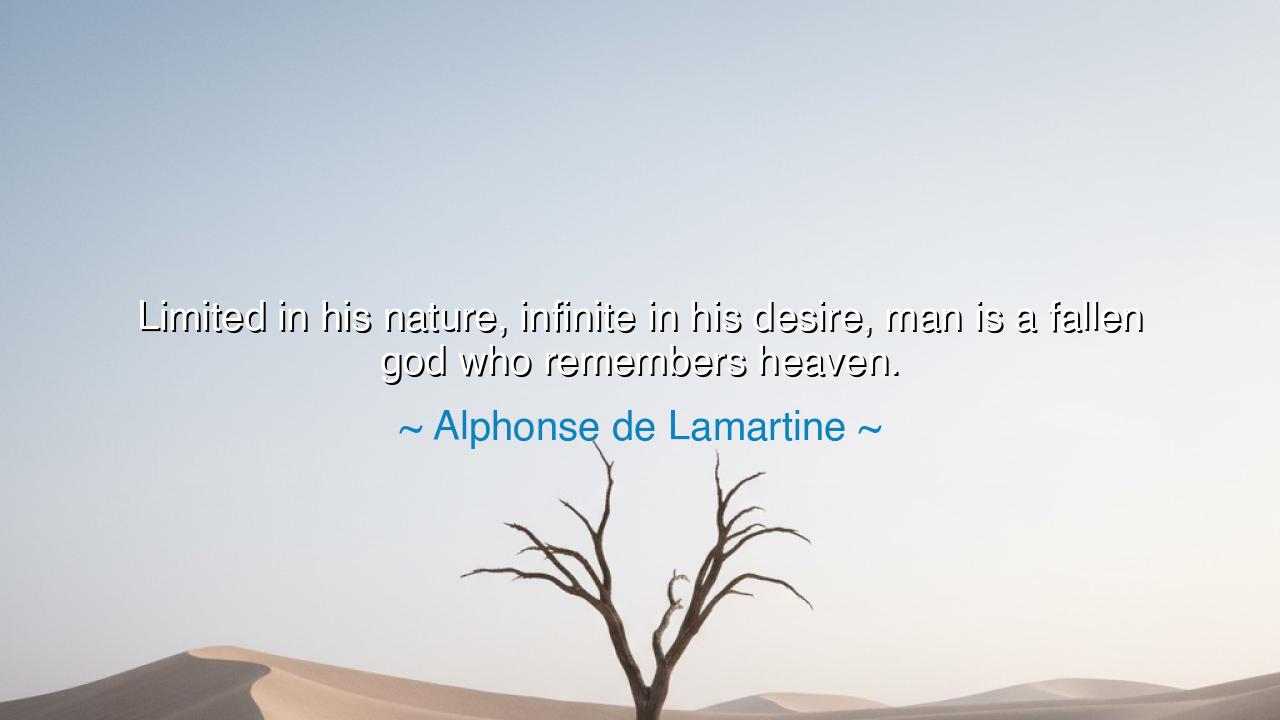
Limited in his nature, infinite in his desire, man is a fallen
Limited in his nature, infinite in his desire, man is a fallen god who remembers heaven.






Alphonse de Lamartine, poet of the Romantic age and voice of longing, once declared: “Limited in his nature, infinite in his desire, man is a fallen god who remembers heaven.” In these words resounds the ancient struggle of the human condition—the tension between the frailty of our mortal bodies and the boundless hunger of our immortal spirit. We are beings of dust, bound by time, yet our hearts ache for eternity. We are chained by weakness, yet our souls yearn for flight. In this paradox, Lamartine captures the drama of humanity: creatures caught between earth and heaven, exile and home.
The origin of this thought lies in the Romantic spirit of the nineteenth century, when poets and philosophers sought to give voice to the unquenchable thirst of man’s soul. Lamartine, steeped in the traditions of Christianity and stirred by the ache of human longing, saw man as a fallen god—a being who once bore the glory of divine likeness but now walks as a shadow of his true self. And yet, within that shadow burns memory: the memory of heaven, of perfection, of an eternal homeland we can scarcely name, but which our desires forever chase.
This vision is not new; it has echoed through the ages. Recall Plato, who spoke of anamnesis—the doctrine that learning is not the gaining of new knowledge, but the remembering of truths the soul once knew before birth. Or consider St. Augustine, who wrote, “Our hearts are restless until they rest in Thee.” Both affirm the same truth that Lamartine later clothed in poetry: man is restless because he remembers what he has lost. His desires are infinite because they seek to reclaim the infinite.
The meaning here is deeply emotional and heroic. To call man “limited in his nature” is to remind him of humility—that his body will perish, his strength will fail, his wisdom will falter. Yet to call him “infinite in his desire” is to affirm his greatness—that within his frailty lies a hunger that no earthbound feast can satisfy. He may eat, drink, love, conquer, create—but none of these will quench him fully. Why? Because he does not hunger merely for bread or glory—he hungers for the divine, for the heaven he dimly remembers.
History provides luminous examples of this paradox. Think of Christopher Columbus, who sailed not only to find new lands but because he was haunted by the sense that something greater lay beyond the horizon. His body was frail, his ships small, his crew doubtful—yet his desire was infinite, and it carried him into the unknown. Or recall the saints and mystics, from Francis of Assisi to Teresa of Ávila, who in their weakness renounced worldly power, yet in their longing touched eternity. They, too, embodied Lamartine’s vision: frail mortals, yet fallen gods remembering heaven.
The lesson is clear: do not despise your desires, for they reveal the grandeur of your destiny. When you feel restless, unsatisfied, even after achievement—know this is not failure, but the sign that you are more than flesh and bone. Your desires are infinite because they point toward the Infinite. Yet also do not scorn your limits, for they remind you of humility, of the need for grace, of the truth that no man can climb to heaven on his own strength alone.
Practically, this means embracing both sides of your condition. Acknowledge your limits: care for your body, temper your pride, accept your frailty. Yet also nurture your desires: seek truth, beauty, justice, and love. Do not numb your hunger with distractions, but let it draw you upward, like a flame reaching for the sky. Read deeply, love fiercely, create boldly, pray humbly. In all things, remember that you are more than what you appear—you are a fallen god who remembers heaven.
Thus Lamartine’s words echo across centuries like a sacred chant: man is fragile yet boundless, broken yet divine, earthborn yet heaven-haunted. To live well is to honor both truths—to walk humbly as a creature of limits, yet to burn with the fire of desire, until at last the restless soul finds rest in the eternal home it has long remembered.






AAdministratorAdministrator
Welcome, honored guests. Please leave a comment, we will respond soon